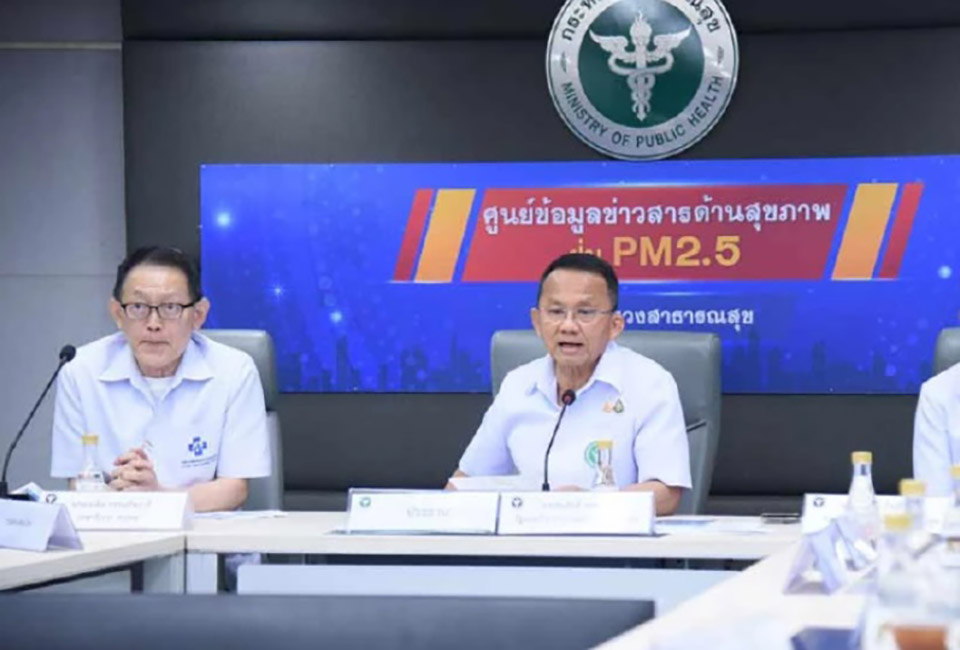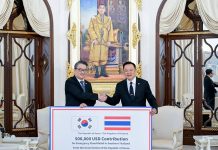
BANGKOK, Thailand – In response to the alarming levels of PM2.5 air pollution affecting various regions in Thailand, Somsak Thepsuthin, Minister of Public Health, on January 26, unveiled a comprehensive set of measures to safeguard public health under the slogan “Check, Use, Avoid, Reduce, Close.” These recommendations aim to raise awareness and encourage proactive steps to mitigate health risks associated with fine particulate pollution.
PM2.5: A Growing Concern
During a press conference, Somsak emphasized the health hazards posed by PM2.5, which has reached concerning levels in multiple areas. The Prime Minister, Ms. Paetongtarn Shinawatra, has instructed ministries to prioritize public health. In response, the Ministry of Public Health has developed specific guidelines to help individuals protect themselves during periods of high pollution.
Color-Coded PM2.5 Levels and Guidelines
The Ministry has categorized PM2.5 pollution levels into five color-coded tiers, with specific actions recommended for each:
- Blue (0-15 µg/m³):
General public: Safe to engage in all outdoor activities.
Sensitive groups: Activities can proceed as usual.
- Green (15.1-25 µg/m³):
General public: Outdoor activities remain safe.
Sensitive groups: Minimize strenuous outdoor activities and monitor for health issues.
- Yellow (25.1-37.5 µg/m³):
General public: Reduce outdoor exercise and physical labor.
Sensitive groups: Limit time spent outdoors, wear protective masks, and seek medical advice if symptoms occur.
- Orange (37.6-75 µg/m³):
General public: Minimize outdoor physical activity, wear masks, and consult a doctor for unusual symptoms.
Sensitive groups: Avoid strenuous activities, remain in dust-free environments, and take extra precautions.
- Red (>75 µg/m³):
General public: Refrain from outdoor physical activity, use protective measures, and stay indoors as much as possible.
Sensitive groups: Avoid outdoor exposure entirely, maintain dust-free spaces, and ensure access to essential medications.
Five Protective Measures: “Check, Use, Avoid, Reduce, Close”
To simplify personal safety measures, the Ministry has introduced the “Check, Use, Avoid, Reduce, Close” framework:
- Check:
Monitor daily air quality using apps such as Air4Thai or Life Dee to assess PM2.5 levels before going outdoors.
- Use:
Wear masks designed to filter fine particulate matter, such as N95 masks, whenever you are outdoors.
- Avoid:
Limit outdoor activities, especially in high-pollution areas, and pay close attention to the health of sensitive groups like children, the elderly, and individuals with respiratory issues.
- Reduce:
Decrease activities that generate PM2.5, such as burning incense, grilling, open-air cooking, or smoking.
Opt for public transportation to reduce vehicle emissions and keep personal vehicles well-maintained to lower pollution output.
- Close:
Keep windows and doors shut tightly to prevent pollution from entering indoor spaces.
Regularly clean homes to minimize dust accumulation and consider creating “dust-free” rooms with air purifiers if necessary.
Health Recommendations for Outdoor Activities
Somsak acknowledged that individuals who enjoy outdoor exercise, such as running in parks or marathons, may continue their activities but should take extra precautions. He advised monitoring air quality, reducing exercise duration when pollution levels are high, and wearing masks to minimize exposure.
Special Precautions for Vulnerable Groups
The Ministry emphasized that individuals with chronic illnesses, such as asthma or heart disease, should carry necessary medications and equipment at all times. They are also advised to consult their doctors for additional guidance during periods of severe air pollution.
Call for Public Awareness
In his closing remarks, Somsak reiterated the importance of collective action in addressing air pollution. He urged citizens to follow the recommended guidelines, monitor air quality closely, and remain vigilant about their health. The Ministry continues to work on long-term solutions to combat PM2.5 pollution and mitigate its impact on public health. (TNA)










